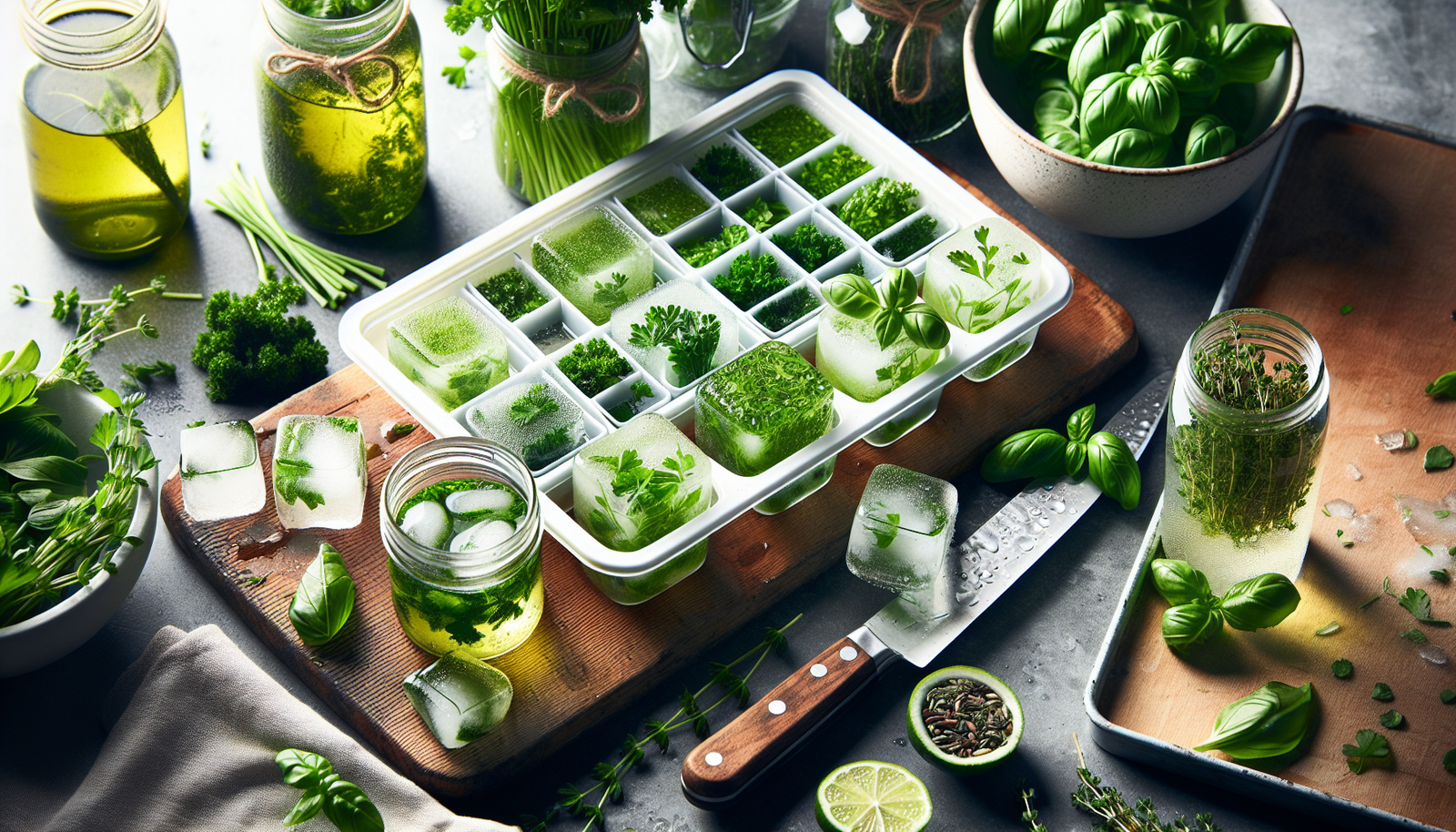
How to Freeze Fresh Herbs for Long-Term Storage
Freeze fresh herbs to enjoy their flavor all year round without any compromise on taste and quality. Preserving herbs like basil, rosemary, and mint in the freezer is a practical approach, allowing you to keep garden-fresh vibrancy in your meals. Surprisingly, frozen herbs retain much of their nutritional value and can even outperform dried herbs in taste. This guide will walk you through easy steps to properly prepare and freeze fresh herbs, helping you save time and reduce waste. Dive in to discover techniques ensuring your favorite herbs stay fresh, potent, and ready for any recipe.
Benefits of Freezing Fresh Herbs
Freezing fresh herbs preserves their flavor, aroma, and nutritional value, making them accessible year-round. As herbs often play a crucial role in enhancing dishes, having them ready to use can transform your cooking experience. This section explores how freezing herbs extends their shelf life, retains essential nutrients, and adds convenience to your daily culinary practices.
Prolonging Shelf Life with Frozen Herbs
Fresh herbs tend to spoil quickly, often leaving you with wilted and unusable leftovers. Freezing is an excellent method to extend their shelf life significantly. By preserving herbs in their prime, you minimize waste and ensure that you always have a supply of your favorites on hand. This method stops the clock on the aging process, keeping herbs vibrant and full of life for months.
Freezing locks in the herbs’ flavors and aromatic oils, which are often lost when herbs are left out to dry or are stored improperly. This technique also maintains the color and texture, making them a perfect addition to your meals even after weeks of storage. The ability to prolong the shelf life of herbs allows for more flexibility in meal planning and preparation.
Retaining Nutritional Value in Frozen Herbs
The nutritional value of herbs is one of their most appealing qualities. Freezing helps retain vital nutrients such as vitamins, antioxidants, and minerals. Unlike drying or other preservation methods, freezing minimizes the loss of these important elements. This ensures your frozen herbs remain a healthy choice for flavoring dishes.
When herbs are frozen shortly after harvesting, they maintain their peak nutritional profile. This means you get the full benefits of their natural goodness each time you use them. Whether you’re cooking a hearty stew or preparing a fresh salad, frozen herbs can provide the same nutritional punch as their fresh counterparts.
Convenience of Using Frozen Herbs in Cooking
Having frozen herbs on hand simplifies meal preparation. They are pre-portioned and ready to use, saving you time and effort in the kitchen. This convenience allows you to focus on creating delicious meals without the hassle of washing, chopping, or worrying about spoilage.
With frozen herbs, you can easily enhance the flavor of your dishes, experimenting with different combinations without the fear of your herbs going bad. They are perfect for spontaneous cooking and add a burst of flavor to any recipe. Imagine reaching into your freezer for a handful of aromatic basil or mint to elevate your pasta or dessert dishes instantly.
Best Practices for Preparing Herbs for Freezing
To make the most out of freezing herbs, proper preparation is key. This includes selecting the freshest herbs, cleaning them thoroughly, and using the right techniques for chopping and storing. Learn how to handle your herbs with care to ensure they retain their flavor and quality when frozen.
Washing and Drying Techniques for Fresh Herbs
Before freezing, it’s crucial to wash herbs to remove any dirt, bacteria, or residual chemicals. Rinse them gently under cool, running water. Careful handling is important to avoid bruising the leaves, which can lead to flavor loss.
After washing, drying herbs thoroughly is essential. Excess moisture can lead to ice crystals, affecting both texture and taste. Use a salad spinner or pat the herbs dry with clean paper towels. Ensure they are completely dry before proceeding, as any leftover moisture can result in soggy herbs once thawed.
Chopping and Portioning Herbs for Freezing
Once clean and dry, chop herbs to your preferred size. Chopping them finely allows for easier portioning and faster thawing. Consider how you typically use the herbs in recipes and prepare them accordingly.
Portion the herbs into quantities that match your cooking needs. This makes it easy to grab just the right amount without having to refreeze unused portions. Using measured amounts also helps maintain the quality of the remaining frozen herbs.
Choosing the Right Packaging for Herb Preservation
Proper packaging is crucial in preserving the quality of frozen herbs. Airtight containers or freezer bags are the best choices. These options prevent freezer burn and protect the herbs from absorbing unwanted odors from other foods.
Label the packages with the type of herb and the date of freezing. This practice helps in identifying them quickly and ensuring they are used while still fresh. Vacuum-sealing options can also be beneficial for long-term storage, although they are not necessary for shorter durations.
Methods for Freezing Various Types of Fresh Herbs
Different herbs have unique textures and flavors, which can dictate the best freezing methods. Whether you’re dealing with delicate leafy herbs or more robust hardy varieties, understanding the nuances in freezing techniques can make all the difference in preserving flavor and quality.
Freezing Leafy Herbs: Basil, Mint, and Cilantro
Leafy herbs like basil, mint, and cilantro are tender and aromatic. To freeze them effectively, consider using a combination of methods to retain their vibrant flavors. One method involves blanching, where you quickly dip the herbs in boiling water, then ice water, to preserve color and nutrients.
After blanching, pat the herbs dry and place them in a single layer on a baking sheet. Freeze until solid, then transfer to airtight containers or freezer bags. This technique prevents clumping, allowing you to take only what you need.
Freezing Hardy Herbs: Rosemary, Thyme, and Sage
Hardy herbs such as rosemary, thyme, and sage have a sturdier structure, making them easier to freeze. These herbs do not require blanching. Simply wash, dry, and spread them on a baking sheet to freeze individually.
Once frozen, transfer the herbs to airtight containers, ensuring minimal air exposure. The robust nature of these herbs allows them to maintain their structure and flavor, even after long periods in the freezer.
Using Ice Cube Trays for Herb Freezing and Storage
Ice cube trays offer a convenient way to freeze herbs in portioned amounts. Simply chop the herbs and place them in the trays, then cover with water or olive oil. This method is especially useful for herbs used in soups, stews, or sautés.
Once frozen, transfer the herb cubes to a labeled freezer bag for easy access. This technique not only saves space but also provides pre-measured quantities, perfect for adding a quick burst of flavor to any dish.
Conclusion
Freezing fresh herbs is an effective way to preserve their flavor for later use. To freeze herbs, wash and pat them dry, then chop or leave whole depending on their intended use. Herbs can be frozen in ice cube trays with water or oil to make them easy to portion out for cooking. Labeling and dating the containers helps keep track of freshness. Freezing herbs doesn’t significantly alter their flavor, making them a convenient option for year-round use.
FAQ
What is the best method to freeze fresh herbs at home?
Freezing herbs in ice cube trays with olive oil or water preserves their flavor and texture. This method minimizes freezer burn and maintains freshness.
Can you freeze fresh herbs without losing flavor?
Yes, using methods like freezing in oil or water helps retain flavor. Quick freezing also locks in the essential oils, which are key to the herbs’ aroma and taste.
How do you prepare fresh herbs for freezing?
Wash the herbs thoroughly and dry them completely. Chop the herbs if desired, then place them in freezer bags or ice cube trays for best results.
Is it better to freeze fresh herbs whole or chopped?
Chopping herbs before freezing can make them easier to use later. However, freezing whole leaves ensures the highest flavor retention. Both methods work well depending on your future use.
What types of fresh herbs freeze well for long-term storage?
Herbs like basil, cilantro, parsley, chives, and dill freeze well. These herbs maintain their flavor and aroma when stored properly in the freezer.
How long can you store frozen fresh herbs without compromising quality?
Frozen fresh herbs maintain good quality for up to six months. Proper storage in airtight containers or freezer bags helps prolong their freshness.











